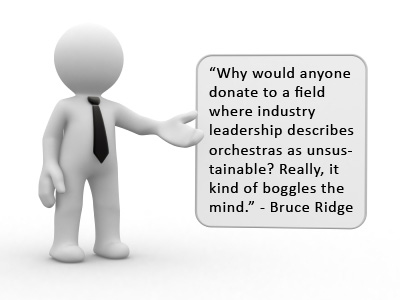Last Monday, I hinted at revealing more details related to the League of American Orchestra’s (League) decision to reject International Conference of Symphony and Opera Musicians (ICSOM) chairman and North Carolina Symphony bassist Bruce Ridge’s offer to participate as an elected musician representative in the League’s “Red Alert!” plenary session at this year’s conference. So let’s jump in and start learning more about what’s going on…
 It seems that Ridge has written a lengthy article for the impending June 2011 issue of Senza Sordino, the official ICSOM newsletter, but due to timing related to the League conference, they decide to release an advance copy. Titled Ending the Doctrine of Failure, Ridge not only recounts the details related to the League’s barring his participation in the plenary (FYI, video from that session is available here), but he rails against growing pay disparity between musicians and orchestra executives, the rise of the Chicken Little Think Tank, disingenuous communication, and the overall negativity of the League.
It seems that Ridge has written a lengthy article for the impending June 2011 issue of Senza Sordino, the official ICSOM newsletter, but due to timing related to the League conference, they decide to release an advance copy. Titled Ending the Doctrine of Failure, Ridge not only recounts the details related to the League’s barring his participation in the plenary (FYI, video from that session is available here), but he rails against growing pay disparity between musicians and orchestra executives, the rise of the Chicken Little Think Tank, disingenuous communication, and the overall negativity of the League.
But the thrust of the article appears to be a call for real and sincere discussion outside the confines of artificial barriers and beyond what Ridge describes as “stereotypical and disproved rhetoric.” But enough summarizing, take the time to read Ridge’s article (original source) and then begin forming your own thoughts and questions.
Ending the Doctrine of Failure
by Bruce Ridge, ICSOM Chairperson
Recently WQXR in New York held a panel discussion called American Orchestras: Endangered Species? And, unfortunately, I’m afraid the title of the session betrayed its bias. The session began with the moderator pronouncing that “orchestras from Honolulu to New Mexico to Syracuse have shut down entirely.” It is this sort of misleading language from within our own field that leads to negative journalism. Most businesses seek to avoid negative publicity, but the symphonic field seems to cultivate it. Of course, the moderator should have said (if he wanted to be accurate) that orchestras in Honolulu, New Mexico, and Syracuse have shut down. Saying essentially that orchestras from sea to shining sea (and beyond) have disappeared implies that the country is littered with dead orchestras. The assertion that orchestras in a path as straight as the crow flies are bankrupt ignores and damages the many success stories along the way. In fact, he might have wanted to mention the successful negotiation of a new collective bargaining agreement for a long hoped for re-start of the Honolulu Symphony. The number of orchestras sustaining themselves quite well depends on whether you take I-40 or I-70, but the opening statement of the moderator did its damage nonetheless.
There is no doubt that there is a conversation that needs to be held about orchestras in America, and there is no doubt that it is not being held. In June, The League of American Orchestras (League) will hold its annual convention in Minneapolis. In response to the “crisis” that has been declared, the League has added a plenary panel at the last minute, which they describe this way:
“In response to pressing field-wide needs, some Conference content has been changed to address the issues that have led to the crises in Detroit, Louisville, Honolulu, Syracuse, New Mexico, and Philadelphia…
The warning signals have been there for years: persistent deficits, less-than-packed houses, concerned patrons and funders questioning continued support, communities in transition asking more of us than we ably deliver, and too many concerts amidst changing and shrinking demand.
Despite great sacrifices from musicians and staffs and stepped up giving from boards and volunteers, too many orchestras—not all, for sure—but far too many, are in critical condition. We can and must act—first, by speaking openly and frankly about our challenges, and next by looking deeply at how we operate.”
When the League made this announcement, we felt that surely if they wanted to hold an “open and frank” conversation, then they would want to include the elected representatives of orchestra musicians. So, I contacted the League and offered to be present for the panel at ICSOM’s expense. I was eager to participate in a positive dialogue, especially as my orchestra’s concert schedule had made it impossible for me to participate in the WQXR panel.
Unfortunately, for its own reasons, the League declined to issue such an invitation to the elected leadership of ICSOM. While the request led to a cordial conversation with the League’s leadership, it nonetheless also led to disappointment and a little bit of confusion, as I was informed that at this conference the League will be awarding its highest honor, the “Golden Baton,” posthumously to Fred Zenone.
Of course, Fred Zenone is widely recognized among ICSOM’s greatest historical leaders, and one who sought to build bridges between all facets of the field. This summer’s ICSOM Conference in Detroit will be dedicated to his memory. That the current ICSOM chair is not welcome to participate in an “open and frank” exchange of ideas at the same conference where a former ICSOM chair will be receiving the League’s highest honor is as ironic as it is disappointing.
I’m not writing about this event to fan the flames of anger and distrust that are so prevalent in the field. No, in fact I am writing with the hope of extinguishing those flames, because that negativity is destroying our field.
In the December issue of Senza Sordino, I wrote: “We can always improve—and we must improve. We can express ourselves in a way that will inspire our audiences and the next generation. No one is inspired by ugly language.” I went on to call for “a teachable moment” for our field among “musicians, orchestra managers, artist’s managements, and journalists.” And while my call has not yet been heeded, I am not ready to admit defeat.
I have often written and spoken about the destructiveness of our field’s propensity to undermine its own potential for success. A new crop of pundits for our field has emerged, often with a negative message and (I fear) an ulterior motive. There is an undignified style of self-promotion that sloughs off the pages of newspapers and blogs when established people write indefensible claims such as “there are no sustainable orchestral models in this country that the field can point to and emulate.” Not only is that untrue, it is destructive to those very places that are succeeding. When a person writes such damaging statements, and then uses a non-profit’s website to heavily promote a personal blog, we have to ask ourselves what it is they are really hoping to achieve.
 There is no lack of prosperity in America. What has changed is the nature of philanthropy. People like to give to organizations they believe in, and they simply won’t believe in organizations that are poorly managed and are discussed in the press as “unsustainable.” Why would anyone donate to a field where industry leadership describes orchestras as unsustainable? Really, it kind of boggles the mind. Even people who sell destructive products know how to portray them in a positive way, but the symphonic field doesn’t know how to be its own advocate. At times it seems that our field only knows how to create radio programs that refer to orchestras as “Endangered Species.”
There is no lack of prosperity in America. What has changed is the nature of philanthropy. People like to give to organizations they believe in, and they simply won’t believe in organizations that are poorly managed and are discussed in the press as “unsustainable.” Why would anyone donate to a field where industry leadership describes orchestras as unsustainable? Really, it kind of boggles the mind. Even people who sell destructive products know how to portray them in a positive way, but the symphonic field doesn’t know how to be its own advocate. At times it seems that our field only knows how to create radio programs that refer to orchestras as “Endangered Species.”
There has never been a greater disparity of wealth in America than exists today. Often our managements claim that economic conditions inhibit fund raising. But according to the Associated Press, America’s corporate CEOs earn more today than they did in 2007, before the onset of the recession. Just last year alone, CEOs averaged an increase in salary of 24%. In the late 1970’s, the wealthiest 1% of Americans earned 9% of the income. Today, that same 1% earns 23% percent of the income, and controls 40% of the nations’ wealth.
ICSOM occasionally finds itself the target of those who preach the doctrine of failure for orchestras. One prolific blogger recently posted a suggestion that it was ICSOM that has led to the problems the field faces, though to be fair he was generous in pointing out that the managements agreed to our apparently unreasonable requests.
When managers and boards enter into the stereotypical debate that demonizes unions, they are overstepping the support of the American people. Even in Wisconsin, polls show that Governor Scott Walker would not be re-elected now, largely because he has overstepped his perceived mandate and brought negative publicity to the business community of his state.
As Alex Ross wrote in The New Yorker on May 9: “What’s new about the current crisis is its sharply political edge, mirroring bigger battles that are taking place across the country. Managements and governing boards have often adopted an anti-union tone, charging that the costs of employing up to a hundred musicians year-round…have become insupportable. … That classical music can still draw a crowd was made clear in March, when YouTube Symphony…lured in thirty-three million people online. … Two orchestras that nearly went bankrupt in 2001—the St. Louis Symphony and the Toronto Symphony—are now thriving. … The problem cases tend to show multiple symptoms of poor management: dubious real-estate moves, ham-fisted labor relations, klutzy P.R., and, above all, a lack of artistic focus. … The classical business needs to start thinking of itself not as a luxury item but as an essential part of the average thinking person’s life.”
We have a document written by the president of the Chicago Symphony (CSO), which states “(The CSO) now must solve a problem which has arisen from economic conditions beyond its control. A deficit has been incurred, and undoubtedly there will be annual deficits for some years to come. This affects the future of the orchestra.” And it continued: “Our problem does not differ in kind from the financial problem that faces each of the…major orchestras in the United States.”
Shocking news—except this was written in April 1940.
It is this type of stereotypical and disproved rhetoric that must be rejected as we seek to find positive solutions for the arts management field.
Just as I have called upon our members to engage in a dialogue of the highest tone, I hope that someone who is actually invited to speak at the League conference will have the courage to do the same for their membership. I challenge them to do so. No, I implore them.
I want to assure the League that while the lack of an invitation to an event that will honor Fred Zenone is an insult to ICSOM, I do not take it as a personal insult. I remain willing to meet with all leaders of our field, to build friendships and engage in serious debate. In fact, two weeks after our offer was declined, the president of the League did write with an invitation for me to meet with the League board at some point in the next year. We will of course accept that invitation with the hope that it will lead to a positive, open, and frank conversation. But it does not alleviate the lost opportunity of having a public conversation at this critical moment. There are real issues before us. We have problems with marketing, media, leadership, board cultivation, and advocacy. We have created a climate where bankruptcy appears to be thought of as a negotiation tactic—when, in fact, bankruptcy is a terrible fund raising tool and a rather undignified way to attempt to escape one’s obligations.
For nearly fifty years, ICSOM has been a leader in this field. Now we must lead again. I urge our members not to cast aspersions toward the League over this event, and I call on the League to change as well. We must not perpetuate this destructive dialogue further.
So if there is a discussion to be had, let’s have it. Name the time and place and I’ll be there, assuming I am not playing a sold-out concert. If we meet this challenge and build an actual dialogue where we aren’t staked out in foxholes, we have a brilliant future to look to, where orchestras thrive and serve the entire community, where young children build foundations for their education through arts activities, where musicians need not lose their jobs, where their salaries will allow them to support their families, and where spouses of musicians facing illness need not lose their health insurance. It is the American dream, and it is not lost to us yet. But should we fail in this effort, then all we have to look forward to is more writers promoting their own names with statements like “American orchestras will keep failing…Darwinism is at work.”
The way things are is not the way things have to be.
On a recent evening, I looked to the upper balcony during my orchestra’s performance of Mahler’s 9th to see it full of young people clearly under the age of 15. Apparently none of them had been told that their dreams are unsustainable.



Drew, thank you for bringing this excellent article to a wider audience. Mr. Ridge has accurately diagnosed the malaise affecting the majority of American arts organizations (not just orchestras) as a symptom of the greater disease that threatens to destroy the equality of economic and cultural opportunity in this country…
The negative misinformation is seeping into every level of the business–I was chatting the other day with some administrators for a major conservatory in a panic about how to train young musicians for the “new reality” of “no orchestra jobs” because orchestras have “simply disappeared” in most communities. Appalled, I tried to assert the obvious opposite, but they looked at me with the condescending pity reserved for the clueless.
I think what we need is a list of all US and Canadian orchestras with a budget higher than say, $1 mil, their actual budget, number of players & concerts, their salary schedule, ticket sales, fundraising and financial condition, etc., in other words, a handout!
This was a good read. Maybe more press on orchestras who are making their budget goals and having even the mildest success would be much better than pointing out those that are struggling. Everyone always remembers and points out the bad things and never the positive.
The legendary and longtime Senator from New York, Daniel Patrick Moynihan once said, “Everyone is entitled to his own opinion, but not to his own facts”. The goal of the “new model” propaganda may be to lower the expectations of graduating music students in the hopes that they will settle for less when they eventually are at the negotiating table. The subtle message of this propaganda is, “you as a musician love music but if you don’t give it away your cherished art form will die.” Musicians must realize that we are highly trained specialists with a product that people do value and are willing to pay for. We add greatly to the quality of life in our communities. Bravo to Bruce Ridge for delivering this message eloquently.
Bravo Bruce!
Any management that can’t market, sell, maintain, sustain, and increase community support and involvement in attending performances of some of the greatest achievements and celebrations of the human spirit (musical compositions), performed by some of the greatest musicians ever to perform it (today’s orchestral musicians), should hand over the reins of their organizations to someone who understands and cares about the “product.” The competence and passion to convey that vision to a public appears to be the exception in today’s musical management and marketing circles.
One of the many problems with the “new modelers” is that they don’t seem to know what an orchestra is, what it does, and how it does it, and how that relates to the audience. How can you “new model” if you really don’t know anything about the model in the first place?
Consider the crazy idea mentioned in Philly’s “new model” declaration regarding finding a new mode of concert dress. This has been tried and rejected by various orchestras over the past decades, so it for sure is not new model, it’s from the scrap heap of lousy ideas that didn’t work.
And quickly now, name five places in your town where you can go four nights a week and see people in white tie and tail coats. Tick, tick, tock…. The symphony is the only place right? This is one of the many things that is totally unique about an orchestra, and the new modelers want to eliminate that? The only place you can see baseball uniforms is at your local ball park. I don’t see baseball talking about “well, if we could just wear football uniforms we could be as popular as the NFL.”
The hipster new modelers who want to make the orchestra as cool and techno as possible in order to attract young audiences will wake up one day and realize that people, regardless of age, are attracted to an orchestra experience because it does not depend on the latest fashions, cell phones, ipads, ipods, tv screens and amplification. These are all the things people are trying to escape from when they enter the shelter of a symphony hall, and the new modelers want to bring all that and more into that space.
Use technology to get people to the hall, and once there, give them respite from all worldly cares in a space that warms the heart, feeds the mind and replenishes and builds them up.
The longer history a living art form or cultural tradition has, the more those who practice it will have to defend it from the new modelers and uninformed intelligentsia who will constantly be saying “how can it possibly continue in today’s world? We’d better help it die gradually and then nobody will notice that its dead.”
I have not yet watched the videos Drew so kindly linked to. From reading comments about them, I am led to believe that this session was essentially a lecture, with opening remarks and two presenters speaking.
Bruce says in his message, “So, I contacted the League and offered to be present for the panel at ICSOM’s expense.”
When I read this several days ago, I was led to believe that this was a panel discussion format where a number of people would make short statements and then either answer questions from a moderator or from the audience. I was upset that this panel would have no representative from the orchestral musician world.
Was this indeed a panel discussion, or was it a lecture/presentation?
Dave,
I was at the session- it started with an address by Jesse Rosen followed by the two presenters.
There was no discussion of the events in Detroit, Syracuse, Louisville, New Mexico, Honolulu, Philadelphia (am I leaving anyone out?) The presentation was not what I, or my colleagues, expected.
It was not a discussion of any sort, and there were no questions. The gist of the morning was that orchestras need to be better capitalized and need to control expenses.
Maybe there were other sessions that addressed the incredible failures of the past year- but I doubt it.
Norbert Nielubowski
Minnesota Orchestra (musician)
Newsflash: There seems to be an assumption somewhere out there that the League of American Orchestras is somehow interest in open honest discussion of issues facing the symphonic industry. Without question, they are not, and haven’t been since I came into this industry in the 1970’s. They are only interested in promoting their agenda, which is to move our industry backwards, so the “managers” who have been through their proven failure of a Fellowship program will be less likely to look stupid when they trash an orchestra, and boards can sit on their ass and do nothing for the orchestras, but enhance their local social/business image. The smart money these days is behind Michael Kaiser’s management training program. My own orchestra’s board chair went to the LAO conference for the first and last time last year, and he described the LAO conference as “perhaps the most depressing gathering of misfits and losers that he had ever encountered.” It is no surprise to me that a growing number of orchestra managements I work with have on their own realized that LAO is counterproductive to their goals, and have either dropped LAO totally or skip the conference. So it should come as no surprise to anyone that of course Jesse Rosen doesn’t want to debate a well educated person like Bruce Ridge in front an audience, because even the League groupies will see what a fraud Jesse and his useless organization is. Why would anyone want to be a part of the nation’s only national advocacy organization that advocates for the destruction of its own industry?
Nathan Kahn, Negotiator
AFM Symphonic Services Division
As each of us goes forth into society, our attitude and the words used to describe the current issues touch and create the views of people who know nothing about what makes an orchestra tick and run.
The horrific views these orchestra’s own management use to describe things to the media sets the stage for plans of doom and gloom rather than problem solving. I find this odd considering if we go down so do they and they are making quite a bit of money on management’s end!
The love for symphonic music is far from dead, I instead say we have a serious void of an entire generation of arts managers and therefore suffer from the lack of solutions other business’ employ in today’s world.
When you point out the positives from an economic and educational standpoint you are brushed off for a fool.
I applaud Bruce Ridge for his skills, knowledge, passion, and ability to communicate solutions with a positive message. The positive view he puts forth for finding answers are what all of us, including management, should be projecting.
We need more ambassadors of the arts like Bruce Ridge. I find the LAO’s decision a mistake and quite frankly, I don’t understand it.
We need to come together, not apart.